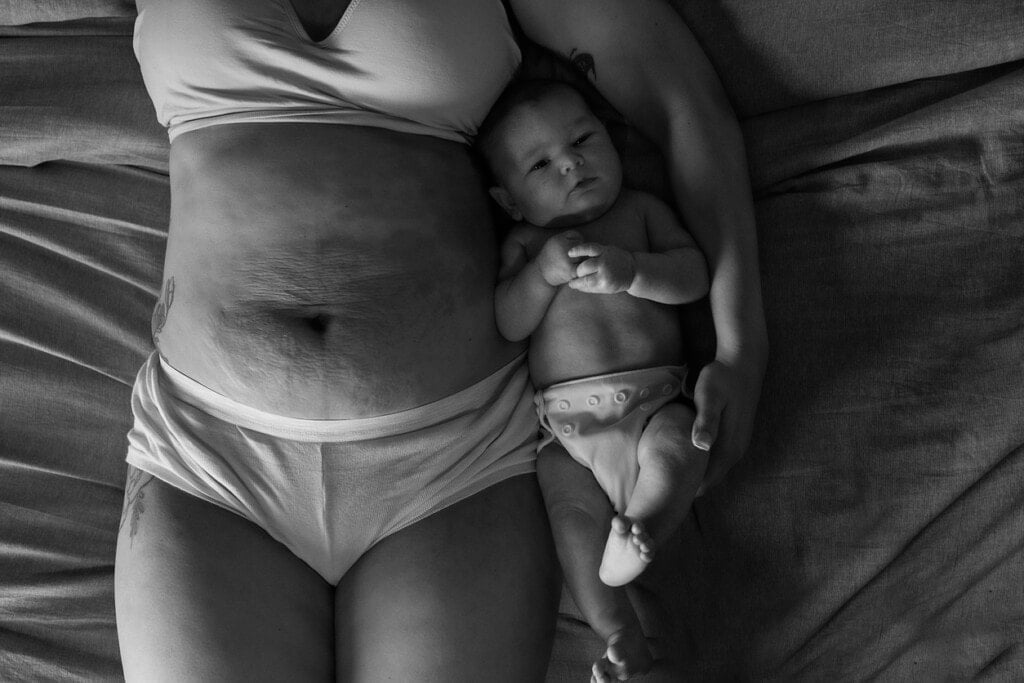During pregnancy, it’s common for there to be a lot of attention on the baby registry, the nursery, the growing bump, and the birth process. What isn’t paid enough attention to (in my opinion) is what life will actually look like once the new baby is born. The postpartum period. While it’s lovely to focus on the pregnancy and birth experience and educate yourself about them and your options, preparing for postpartum life is also essential.
As a birth doula and postpartum doula, I’ve worked with hundreds of new parents. They all understand that the postpartum period may be difficult; however, many are taken aback when they realize just how challenging things can be with a new baby. How can people have a better postpartum experience? The answer is the same as having a better pregnancy and birth — plan ahead.
Why Should We Focus on Postpartum During Pregnancy?
Preparing for your postpartum experience in advance can make an immense difference in your stress levels, mood, and relationships during the first days, weeks, and months with a newborn. It might even help prevent postpartum depression or other mood disorders.1,2
“Most couples find it hard to think beyond the birth, but there’s so much they can do to plan for a positive postpartum experience,” says Elly Taylor, a parenthood researcher and author of “Becoming Us: 8 Steps To Grow A Family That Thrives.” “I call it nest-building: plan to take as much time off work as possible, gather your support system (it takes a village!), and have your partner actively involved from the get-go.”
I love this idea of nest-building. But how exactly do you build that nest? I’m sharing nine suggestions to help you have a more positive postpartum experience.
9 Ways To Prepare for Postpartum Life
1. Become Educated About New Motherhood
In our modern reality, many of us are not exposed to babies and new motherhood as much as our grandmothers and those before her were. While so much of parenting is instinct and intuition, seeking community wisdom and knowledge can make you a more confident new parent.
Take time to learn about newborns — their needs, cues, sleep and feeding rhythms, safe sleep practices, newborn care, etc. — and what is typical for new mothers to experience. You will also experience many changes after birth: physically (the postpartum body — like involution, night sweats, and hormonal shakes) and emotionally (postpartum mood disorders). Also, partners can get postpartum depression and postpartum anxiety too. This is why taking classes, reading books and articles, and talking to professionals and mothers around you is encouraged.
2. Write a Postpartum Plan
Writing a postpartum plan can be as simple as a list of important numbers. This list can include your doctor or midwife, pediatrician, doula, lactation consultant, therapist or counselor, sleep consultant, night nanny, etc. It can also be more detailed and comprehensive. This exercise of thinking about it and discussing what postpartum life will be like with the people in your life will be almost as valuable to you as the actual plan. We have an awesome postpartum plan template that can help you get started.
3. Make a Postpartum Recovery Kit
It isn’t an ideal situation to send your partner out to run to the local corner store to pick up some pads or stool softeners for you after you return home from the hospital. This is why preparing for your postpartum life in advance and having a basket or caddy filled with these postpartum recovery items will be so helpful. We have a complete list of postpartum items for mom and baby and a list of C-section recovery items we recommend having on hand.
4. Think About Your Meals Ahead of Time
Having at least one meal a day already planned, prepped, and prepared in advance is a lifesaver! Think ahead about your meals after having the baby and freeze some postpartum meals. It’s great if you’ve been cooking extra food and freezing it toward the end of your pregnancy. Also, don’t hesitate to ask your community for help, too. MealTrain is an excellent service you can use to organize a group of people to bring you meals. It’s also free!
5. Set Healthy Boundaries
Of course, your family and friends are so excited to meet the baby! You don’t want to diminish their excitement, but you need to ensure you’re not overwhelmed with well-meaning visitors just after giving birth. While some people want company soon after birth, others prefer to wait a few days or weeks before introducing the baby to others. Neither way is wrong; it’s what you prefer. This is why it’s good to talk to your partner in advance about your wishes as a family. Setting clear boundaries with family and friends helps. For example, you can say, “We’re only having immediate family visit us in the hospital,” or “We’re hoping to limit visits to 30 minutes so we can rest.” Do whatever works for you but make sure to communicate them with others.
Boundaries can also include conversation topics or advice, i.e., “If we need breastfeeding help, we will ask you for it,” or “I know you think cloth diapering is too difficult, but it’s what we plan to try. I would appreciate your support.” Setting expectations for the kind of company and support you want can help avoid hurt feelings and conflict during the often raw and tender postpartum period. The conversations may be awkward at first, but clear communication is always worth it in the end.
6. Let Yourself Rest
Postpartum is the time when you need to rest and be nourished. Your body has been through a major event, and you have a large wound inside your uterus where your placenta used to be attached that needs to heal. It’s recommended for new mothers to rest during the postpartum period, especially the first two weeks after birth. Rest in these early weeks will help your bleeding subside quicker and help you recover and feel better.3,4
7. Ask for Help and Accept Help
You don’t have to go through postpartum alone. Asking for help doesn’t make you any less of a mother. Most of us need it! So, if you need help, ask for it! I have found that women in our culture are often scared or embarrassed to admit they need assistance in early motherhood, but there’s no shame in reaching out to others for a helping hand. Partners sometimes don’t know how they can help but are willing to help however they can. And experienced moms know just how hard it is to have a newborn and are often happy to help, even if that help involves just coming over to sit on your couch and listen to you cry. So, speak up and text out that SOS message. You can repay the favor once you feel more confident.
Helpful:
8. Hire a Postpartum Doula
Don’t have family nearby? Don’t want family nearby? Are you a single parent, or does your partner have limited leave? A postpartum doula can be just the thing to help ease you into new parenthood. Postpartum doulas are trained in infant care, breastfeeding, and general support of postpartum families. They also do light cooking and cleaning, errands—basically whatever you need to make your life more calm and manageable with a newborn. They generally charge by the hour, but you can buy a package or just a few hours of help. This can be on a regular schedule or only when you feel you need it. Some postpartum doulas will also do overnights, giving you the precious rest you need to recharge and care for your baby. Check out DONA International (here) or CAPPA (here) for a list of postpartum doulas in your area.
9. Set Your Expectations Low
This may sound harsh, but lower your expectations for what life as a new parent will be like. Whatever you’re picturing, it’s likely not going to look exactly like that—and that’s okay. Some days, just getting out of the house to buy a nipple shield at Target or taking a shower is all you’ll be able to do. Give yourself the emotional and mental space for your postpartum experience to be whatever it will be—both positive and negative. Don’t expect life to be anything like it was before you gave birth. You’ll find your new normal in time.
When you and your partner prepare for postpartum life ahead of time, it can help start this new chapter on the right foot. You’ll feel more confident knowing what is normal and what isn’t and where you can turn to for help. I hope this helps you get started on your nest-building before your baby arrives and have a more positive postpartum!





























